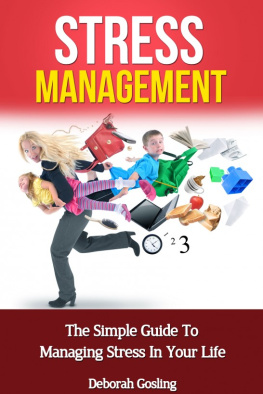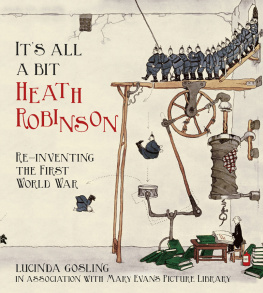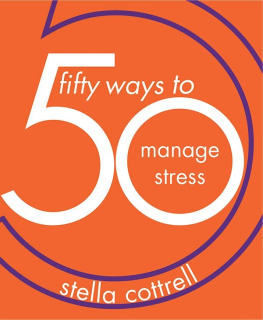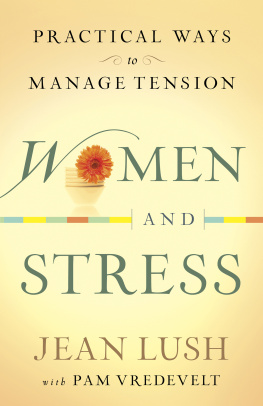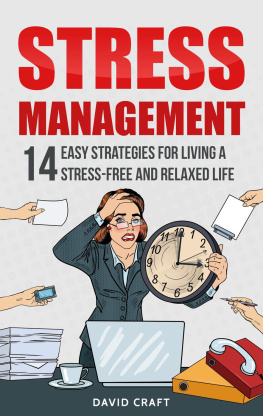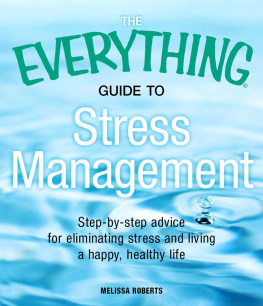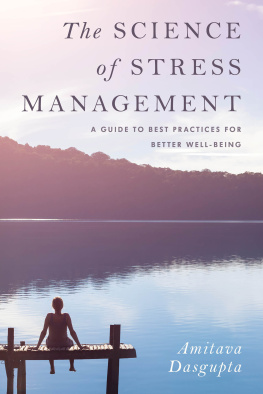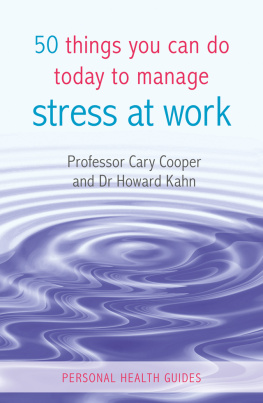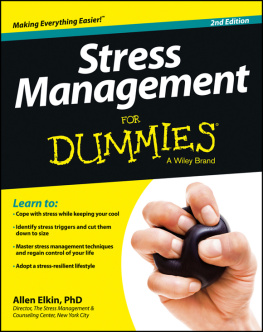Gosling - Stress Management
Here you can read online Gosling - Stress Management full text of the book (entire story) in english for free. Download pdf and epub, get meaning, cover and reviews about this ebook. genre: Religion. Description of the work, (preface) as well as reviews are available. Best literature library LitArk.com created for fans of good reading and offers a wide selection of genres:
Romance novel
Science fiction
Adventure
Detective
Science
History
Home and family
Prose
Art
Politics
Computer
Non-fiction
Religion
Business
Children
Humor
Choose a favorite category and find really read worthwhile books. Enjoy immersion in the world of imagination, feel the emotions of the characters or learn something new for yourself, make an fascinating discovery.
Stress Management: summary, description and annotation
We offer to read an annotation, description, summary or preface (depends on what the author of the book "Stress Management" wrote himself). If you haven't found the necessary information about the book — write in the comments, we will try to find it.
Stress Management — read online for free the complete book (whole text) full work
Below is the text of the book, divided by pages. System saving the place of the last page read, allows you to conveniently read the book "Stress Management" online for free, without having to search again every time where you left off. Put a bookmark, and you can go to the page where you finished reading at any time.
Font size:
Interval:
Bookmark:
StressManagement
Deborah Gosling
Copyright 2014
Contents
Deborah Gosling has beenhelping individuals and families for over 10 years and is aspecialist in emotional intelligence, stress reduction,productivity and relationships. In her books Deborah providesadvice and tips that can be implemented in every area of life, andshe places emphasis on taking action to improve and enhance yourquality of life.
There some things in lifethat are certain, and stress is a fact of life, wherever you arewhatever you are doing you cannot avoid stress. But, dontdespair, just like you can manage many things in life, you can alsomanage stress and reduce its effect significantly. Only 20 yearsago stress management was not a household word as it is today, butsince practitioners and physicians realized that stress was theroot cause of why people were seeking psychotherapy and medicalconsultation it caused stress management to be adopted as anon-medical way of dealing and coping with stress. Stress comesabout as result of many complex changes in which you must adapt toand includes such things as going to college, getting married,changing jobs, moving house, illnesses, grief and many other thingsthat cannot be enumerated here. To manage stress successfully it isimportant to be conscious of yourself, surroundings and considerthe root causes of your stress. Initially, this will take sometime, but it will significantly improve your ability to managestress and will greatly improve both your mental and physicalwellbeing. You will find in this book some proven practical stepsand strategies that will help you to relieve stress, and live amore happy, healthy and fulfilling life.
This book has been created to teachyou the most effective stress management and relaxation techniquesand exercises. This book is like a guide that will help youincrease your awareness of your personal reaction to stress and itwill help you to control and master the stressors in your life. Thebook is split up into two parts, the first part defines stress,causes and how to cope with stress generally. Once you go throughthe first part, you will know enough about stress and your personalreactions to stress. The second part of the book teaches youtechniques for coping with stress and includes techniques andexercises that you can use to manage and deal with stress. Thebenefits of the techniques and exercises that are discussed in thisbook will only be realized when you practice them regularly over aperiod of time. Merely understanding the exercises & techniquesintellectually will not help you to reduce stress, but when youtake action and implement the exercises first hand you will reapthe benefits. To fully utilize the techniques and exercisesoutlined in this book I recommend the following:
Choose a quiet place where you willnot be interrupted to do your exercises
Spend 10 to 15 minutes each day doingthe exercises
Consider doing the exercises withanother person. This will help you share your experiences and youcan support and encourage each other.
If you have a busy schedule and timeis tight, make an appointment with yourself and schedule it in yourdairy.
If your reaction to stress involves physicalsymptoms such as frequent headaches, stomach problems, or highblood pressure, then you should make an appointment with yourdoctor for a physical examination before you begin theseexercises.
Part 1: Overview ofStress
As human beings, stress isa natural part of life and we all experience stress whether we likeit or not, it is a simple fact of life. Stress is something that wecannot avoid. People often think of stress as too much mental oremotional pressure, but physiological or physical stress is alsoimportant. Stress affects how you feel, think, and behave as wellas how your body works. In order to better understand stress, it isimportant that we first define what stress is scientifically.Stress causes a surge of hormones in your body. When you arestressed your body reacts by stimulating the body to producehormones that include adrenaline and cortisol. Essentially, thesehormones help you to deal with any threats or pressure that you arefaced with. This is called the fight or flight response. Thehormones that your body produces increase heart rate, raise yourblood pressure and they provide extra energy. Cortisol, which isknown as the stress hormone, increases energy by triggering therelease of glucose into the blood stream, in order to help theperson fight or run away. The human body adapts to differentsituations and regulates itself, when your hormone levels fall,your heart and blood pressure are returned to normal.
However, believe it ornot, we all need stress to live well, some stress can be positive,like the exhilaration of falling in love or achieving some longdesired success. But, as with most things in life, too much stressis what causes us to have physical and psychological problems. Lackof stress means that your body is under stimulated, when stress istoo intense or is prolonged over a long period of time, this causesyour body to release stress for months and this increases the riskof a range of health problems including headaches, stomach upsetsand high blood pressure. In more severe cases stress can increasethe risk of having a stroke or heart attack. Stress can also leadto psychological problems and it can make people feel anxious,fearful, angry and can destroy relationships both at home and atwork. Stress is also a key player in the development of anxiety anddepression. Long-term stress can cause diabetes, high bloodpressure, obesity and can interfere with your immune system.Therefore chronic stress can seriously harm your health, well-beingand destroy your quality of life.
There are many things thatcause stress, people have different triggers for stress, even yourchild screaming can cause you to become stressed. Work demands,changes in work patterns or feeling unsure at work can cause you tobe stressed. If youre a student and you have exams coming up thisis often a major cause of stress for students. If you have moneyproblems, this is one of the more common causes of stress, as weare constantly worried about our financial situation, relationshipswith partners, your children or other family members is often acause of every day stress. If you had a loved one pass away, thenthis is also one of the major triggers of stress and this can lastfor a long period of time. The following lists some common causesof stress:
Divorce
Loss of a job
Having a heavy workload ortoo much responsibility
Being insecure about yourjob and risk of termination
Emotional problems,including anxiety, depression, and anger
Traumatic events in yourlife, such as death, rape or violence against you or a lovedone
However, many people havestress because of worrying about things in the future and whatmight happen. These include having fear and uncertainty about athreat of violence, and becoming pessimistic as a result ofwatching negative news. Your brain interprets complex changes inyour environment and body and determines when to respond to anemergency. It is now more common for the cause of stress to besocial called socialstressors , such as deadlines, jobinterviews, presentations, disagreements and demand for your timeand attention. Another cause of stress is physiological. The growthof adolescence, menopause in women, ageing, injuries, illness, lackof sleep, and injuries are all sources of stress.
It is paramount torecognize the signs of stress early to prevent stress fromworsening and potentially causing other serious health problems.There are no specific scientifically proven tests to diagnosestress, but it is possible to identify stress from symptoms. It isimportant to keep in mind that the signs and symptoms of stress canalso be caused by other psychological or medical problems. If youexperience any of the signs of stress it is important to see adoctor for a full evaluation, your doctor can then determinewhether any of your symptoms are stress related and rule out anyother physiological or medical illnesses. The signs and symptoms ofstress can be categorized into four different symptoms, theseare; cognitive symptoms , emotionalsymptoms , physical symptoms and behavioral symptoms .
Next pageFont size:
Interval:
Bookmark:
Similar books «Stress Management»
Look at similar books to Stress Management. We have selected literature similar in name and meaning in the hope of providing readers with more options to find new, interesting, not yet read works.
Discussion, reviews of the book Stress Management and just readers' own opinions. Leave your comments, write what you think about the work, its meaning or the main characters. Specify what exactly you liked and what you didn't like, and why you think so.

